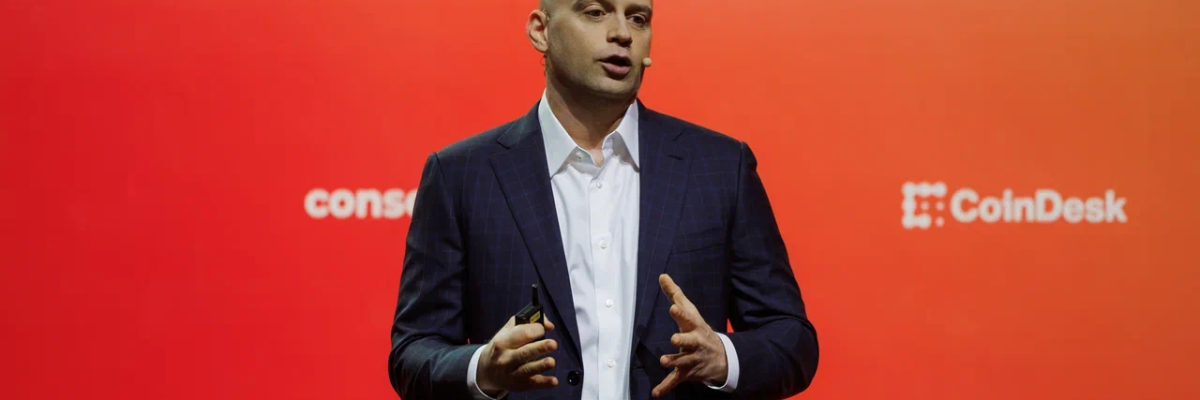Alex Reinhardt's name is practically synonymous with innovation in the world of blockchain technology. The crypto expert and true veteran of the crypto market has extensive experience in launching international startups. Venture capitalist, business coach, and serial entrepreneur, he was one of the first to realise the limitations of the first-generation cryptocurrencies, in particular their scaling problems, and offered innovative solutions. Today, Alex Reinhardt has agreed to share his opinion on the most pressing issues that concern modern investors.

A short biographical overview: Alex Reinhardt is a German who was born and raised in Russia, but returned to his historical homeland at the age of 15. He has a Degree in Economics from the Humboldt University of Berlin and helped start-ups raise investments, totalling around half a billion euros, before becoming an independent entrepreneur. Throughout his career, Alex Reinhardt has also launched more than 20 successful IT and FinTech projects, held more than 100 educational seminars, and written a bestselling book on leadership.
Hitecher: How did your journey in the blockchain industry begin?
Alex Reinhardt: I was first introduced to blockchain back in 2011 when Bitcoin was officially proclaimed the first decentralised digital currency and the media started reporting on it. Oh, I was absolutely fascinated and captivated! After all, blockchain seemed like such a wondrous innovation at the time, embodying every single ideal that digital geeks and liberals had in mind. Transparency, the need for consensus, maximum security, speed, and anonymity — something that traditional finance never had. Naturally, it's spellbinding.
This is the reason why I actually decided to invest in blockchain and firmly commit my life to it. Of course, my immersion into the world of cryptocurrencies started small, as most people would have. I simply read as many articles as possible in various magazines and online, invested in Bitcoin. Like many of my friends, I patiently waited for everyone else to realise that the digital currency was the future and it would “blow up” the market, which it did, as a matter of fact..
Hitecher: Beyond the anonymity and decentralisation that you mentioned, what exactly is it about blockchain that appeals to the public? Is there something else behind just freedom?
Alex Reinhardt: Of course. As both an investor and a humanitarian, I believe blockchain has limitless potential to improve the quality of life for people around the world. It is a piece of the puzzle that is often overlooked by businesses facing stagnation, and yet it fits any kind of jigsaw. Blockchain is applicable in every niche, from gaming to healthcare, logistics, and even the arts (think NFTs). For example, thanks to cryptocurrencies, people in a number of countries in Asia, Africa, and Latin America have, for the first time, gained access to financial instruments and high-tech opportunities to earn money. And it no longer requires any sort of ultra-complex technical knowledge and education. You can easily learn it online. Furthermore, greater prosperity is found in areas with new revenue streams.
Blockchain also bridges the gap between high-tech and traditional markets. Digitalisation and smart contracts, for one, have made it possible to carry out complex transactions and deals at the snap of a finger. Who among us hasn't complained at least once about painstaking bureaucracy? Blockchain makes everything simpler and more reliable.
Hitecher: You are also known to have experience in crowdfunding. To be more precise, your first project was a blockchain-based crowdfunding platform. How do such platforms benefit investors and entrepreneurs? Are there any pitfalls here?
Alex Reinhardt: By the time I got into crowdfunding, I had already been working with startups for ten years and helping them raise investment. However, there was no tool that could scale that investment and, roughly speaking, turn the millions raised into billions. And this is a problem that aspiring entrepreneurs face all the time… That's when I came up with the idea of combining crowdfunding with blockchain technology. Nowadays, of course, there are many such platforms. They are straightforward and easy to work with, just like classic crowdfunding: you tell people about your project, attract interested parties, and raise money for its realisation. Only it all happens in cryptocurrency, and due to the in-built staking technology, this amount can increase in the process of fundraising by itself, as passive income. This makes it easier to attract investment and raises the chances that the startup will be successfully launched.
As for the pitfalls, there are still two problems, or rather, two barriers — the lack of top-level specialists (and such platforms require an incredibly high level of blockchain proficiency) and legislation in different countries. The situation with the first issue has improved compared to 2015, but as for the second… Regulators are still sceptical about cryptocurrencies, and the licensing process for crowdfunding platforms based on them is very complicated and expensive, especially for EU countries. My team and I even had to temporarily postpone the project at that time and switch to other ventures, as the decision was being delayed. Although everyone has now recognised the benefits of blockchain and started to actively implement them in the traditional market, the question of legal regulation remains open.
Hitecher: You are dealing with cryptocurrency investors and startups in this field all the time. What problems do they face most often? More precisely, what do these challenges generally arise from?
Alex Reinhardt: When you venture into any business, you must realise that it is always turbulent, volatile, and changing, like a storm. To avoid drowning in the depths of the waters, you need a lifeline of knowledge, and this is what most investors and entrepreneurs lack. You don't have to get an economics degree, but you should first become an expert in finance and sales, and then go into business. Also, networking knowledge (business connections are gold!), a strong image, and leadership skills will certainly come in handy. Keep learning, learning, and learning some more. Alas, most people don't like it.
Another issue is lack of self-discipline and, as a result, loss of consistency. As you know, to reach a goal, you need to fulfil a number of micro-goals. You cannot first create a product and then start a business plan or write a white paper, no. The key is to follow a logical sequence and not try to jump over the precipice at once — that's the lack of a strategy. Finally, many investors like to invest in cryptocurrency or businesses, but never invest in themselves — and this is a huge mistake. It is precisely what leads to a lack of knowledge about how businesses and cryptocurrencies work, and that, in turn, results in a complete lack of consistency and self-discipline.
As you can see, all the difficulties I have listed are purely personal, subjective. There is nothing in cryptocurrencies or business that could not be overcome if you learn and advance further.
Hitecher: What do you think about mining? Are the accusations that this technology is “morally obsolete” and environmentally unfriendly justified?
Alex Reinhardt: There is, unfortunately, a great deal of truth in this. Mining was the first cryptocurrency extraction technology ever, so it is only natural that in the course of its development it began to produce and demand other, more flexible and modern approaches. You've probably heard about the Cambridge Centre's study that found that mining used as much electricity annually as Argentina does, right? Those are some truly astounding numbers. Of course, there is a need for alternative solutions.
Nowadays, there are much more efficient ways to make money from cryptocurrencies, for example, staking. It requires little resources, and it also doesn't call for any special equipment or knowledge! You download an app on your phone, freeze the available amount of cryptocurrency for a convenient period of time, and that's it. I mean, this is collaborative coin generation shared between users, if you talk about how it works. This makes cryptocurrencies more accessible and convenient for society, and blockchain is about making the world more comfortable to live in. Mining really doesn't live up to those ideals.
Hitecher: Is Bitcoin timeless? Any predictions on when it will have a worthy replacement?
Alex Reinhardt: I'm afraid no crypto expert can give you a clear answer to this question. We can only speak about it from a subjective point of view, and my opinion is yes, Bitcoin is a forever thing, and although it will definitely have strong innovative competitors, it will not surrender the first place to anyone in the coming decades. At the very least, thanks to a massive community that believes in it, Bitcoin is one of the few cryptocurrencies that has already gained undeniable trust even among conservatives. On top of that, you and I know several stories about how “Bitcoin's successors that are the future” have already appeared on the market. And where are they all now? That's right. The attempts to beat Bitcoin and the projects' loud claims about it are all more of a marketing ploy.
That being said, however, I am not denying that Bitcoin will lose ground. It will lose its position, regain it, lose it again… It's a cycle. Also, its share in the crypto market is gradually shrinking due to the rise in the number of altcoins: if 8 years ago, it accounted for 70% of the market, now it has about 50%. But, again, it is too early to talk about its retreat from the first place. It will definitely not happen within the next 10–20 years, in my opinion.
Hitecher: How do you assess the price dynamics of Bitcoin? Is it worth investing in it now, as of April 2025, or is it better to wait?
Alex Reinhardt: We shouldn't neglect the classic rule of trading: buy low, sell high. The halving in April 2024, when the reward for finding each new block of the network was halved, i.e. miners' rewards were also halved, certainly revived the interest in Bitcoin. Bitcoin then saw a new surge due to the scarcity created, fuelling demand. After the halving, however, there was a quick natural decline… And then, when Donald Trump won the presidential election in the autumn of 2025, it went up again. This is what I was talking about — a continuous cycle. Sadly, the price of Bitcoin can't stay at $100,000 forever.
Of course, you should not buy it at the peak. It is always better to buy crypto in a “bearish market”, when general panic before a long crypto winter and overselling collapses the price rate, or some geopolitical and economic events do it. Right now, the price of Bitcoin is relatively good, but it's not the best price to invest at either. It is better to wait, especially if you already have BTC on your hands. Keep an eye on the underlying fundamentals and incentives, such as positive statistics on capital inflows into new spot bitcoin ETFs.
Hitecher: What is the most challenging thing you can encounter when developing and launching your blockchain project?
Alex Reinhardt: Not having an idea or unity around that concept. In cryptocurrencies, the community you build around your cryptocurrency matters a lot, and this community must understand why they need this cryptocurrency (or any of your other projects). Many startup entrepreneurs quite suddenly realise over time that their project doesn't actually bring any real utility — and then that's it, that's the end of it. Any business that lacks utility is doomed to perish.
On the technical side, a lot of them have scalability issues, which is inherent in many blockchains, and we are just in the process of overcoming that. It's not enough to embrace innovation; you need to adapt it to your ecosystem and to rapidly changing technology trends. So, to realise the potential of blockchain in a project, you need to make it flexible, easy to customise and, most importantly, accessible to everyone. This comes back to community: accessibility and participatory nature will make the project more attractive to both the audience and potential partners and investors.
Hitecher: How do you choose the right blockchain tools for your business?
Alex Reinhardt: Choosing the right blockchain platform should be based on the needs of the specific project. Again, I would definitely recommend looking at scalability — even if you run a small business, you're aiming to make it big one day, right? Transaction processing speed, as well as cost of usage and developer support are also important. Always start with testing; check the reliability and security of the solutions you are going to integrate into your ecosystem. Don't fall for sweet promises, low production costs, and everything that fits the saying "there's no such thing as a free lunch." It is better to spend more time and resources to create a stable foundation than to deal with problems, failures, and hacker attacks later.
Hitecher: Lastly, a piece of advice for aspiring entrepreneurs or those who are just thinking of stepping into the cryptocurrency market.
Alex Reinhardt: Firstly, as you may have already realised from my other answers, the absolute priority is to educate yourself, constantly stay informed about ongoing changes in the market, track trends, and start navigating the whole cryptocurrency whirlwind before you become a part of it. Secondly, and ironically, 90% of success is down to the human factor. For example, it's hard not to give up and quit when you don't see results for a long time. Here, you will have to be self-confident and have a leadership mindset, an almost blind faith that no matter how unattainable the goal is, you are the one who can achieve it. I spent a whopping five years working on launching one of my first projects before the idea gained traction, so be patient. Focus on the obstacles to overcome and don't deny the problems. Solve them in a timely and consistent manner, and apply all the same skills and tools you used in your previous career: planning, management, road map, etc. And, of course, do not invest more than you are willing to lose — that's the golden rule of being a newbie!
Share this with your friends!





Be the first to comment
Please log in to comment